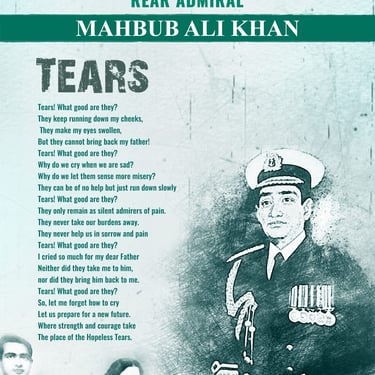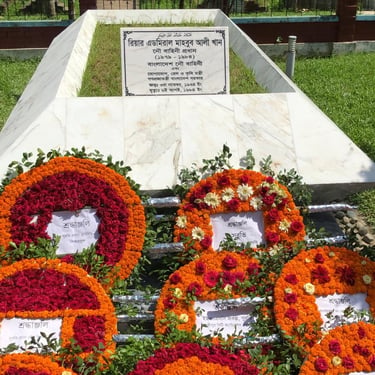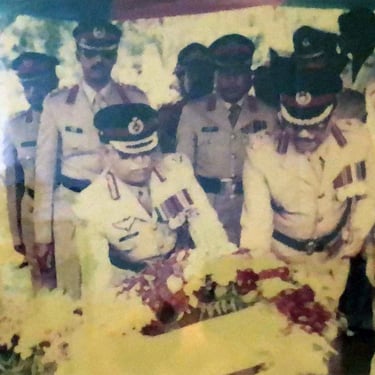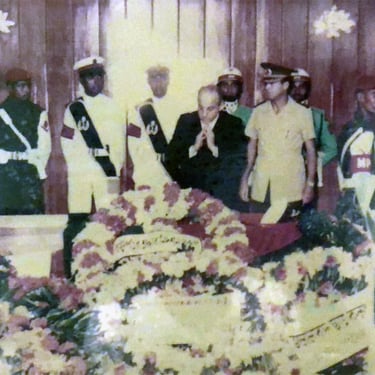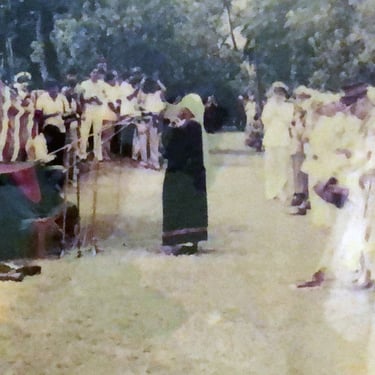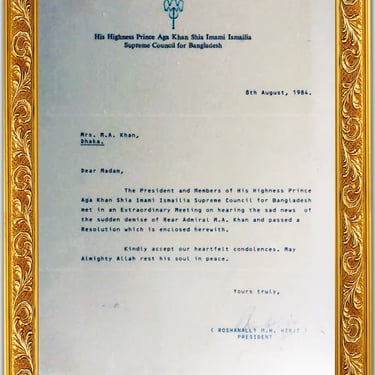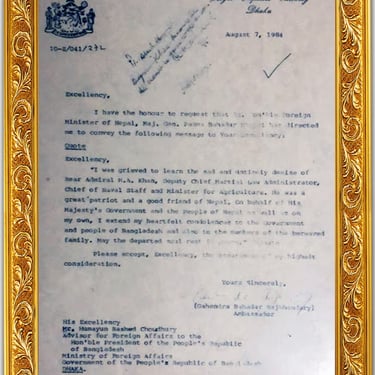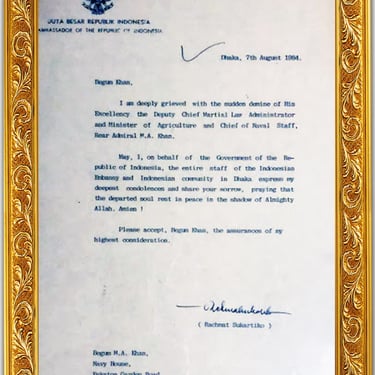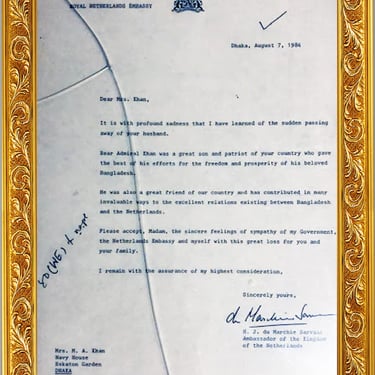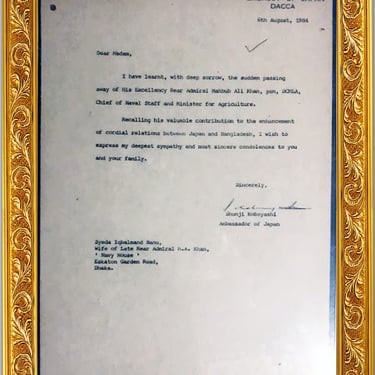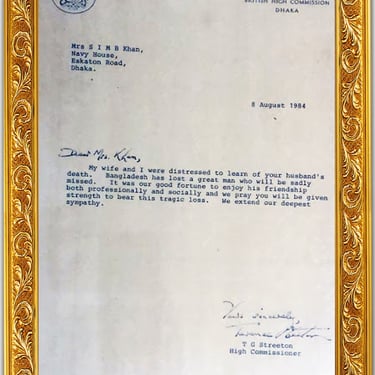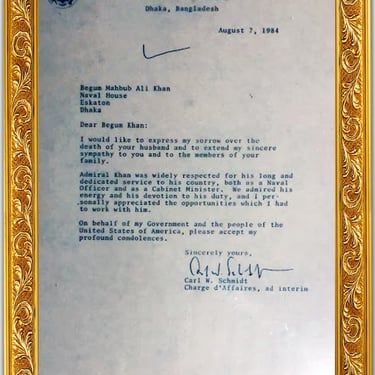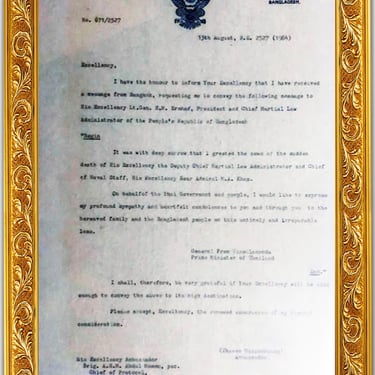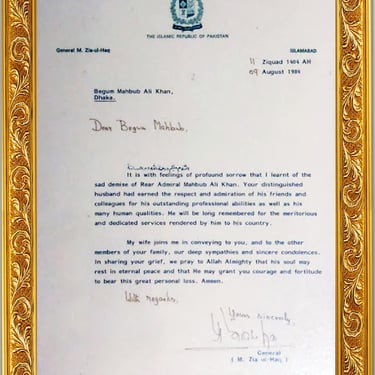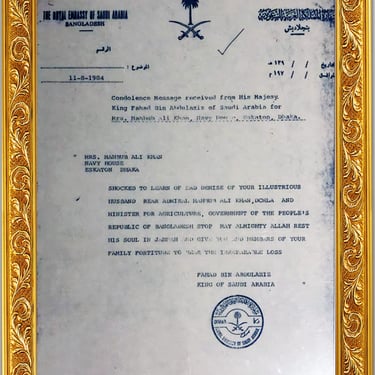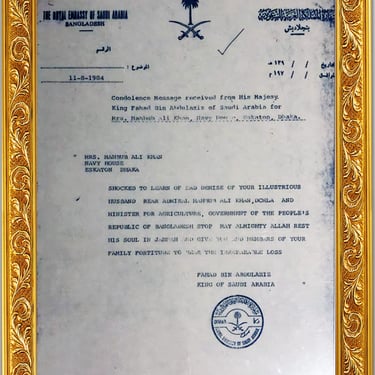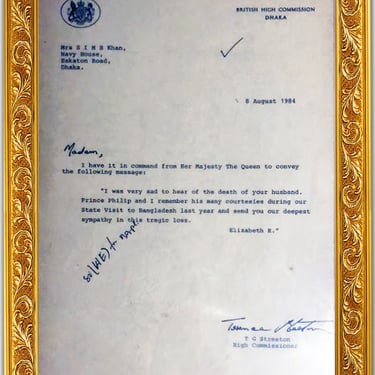Rear Admiral Mahbub Ali Khan: Navigator of a Nation
Early Life and Family Background of Mahbub Ali Khan
Rear Admiral Mahbub Ali Khan was born on 3rd November 1934 in Birahimpur village, Silam Union, South Surma, Sylhet. He was the youngest of three siblings.
He was the youngest of three children born to Ahmed Ali Khan and Jubaida Khatun.
His family came from a distinguished background steeped in legal, political, and medical achievement. His father, Ahmed Ali Khan, was a pioneering figure—he became the first Muslim barrister in Sylhet in 1901. A prominent member of the All-India Muslim League, Ahmed Ali Khan also served as a Member of the Legislative Assembly and once held the position of President of the Assam Congress during British colonial rule.
Mahbub's paternal lineage reflected a strong tradition of intellectual excellence. His grandfather was a well-known physician in Calcutta and served as the personal doctor to Syed Hasan Imam, a prominent Bihari Shia lawyer-politician, senior barrister at the Calcutta High Court, and former President of the Indian National Congress. His great-uncle, Ghazanfar Ali Khan, OBE, ICS, was the first Muslim from Sylhet to graduate from the University of Cambridge—a significant milestone at the time.
Among Mahbub Ali Khan’s extended family was his cousin, General M. A. G. Osmani, the legendary Supreme Commander of the Bangladesh Forces during the 1971 Liberation War. His family legacy of excellence continued into the next generation as well—his niece, Irene Khan, became a Harvard-educated lawyer and served as Secretary General of Amnesty International.
Mahbub spent his early years in Sylhet and Kolkata. Following the Partition of India in 1947, his family relocated to Dhaka, in what was then East Pakistan. He began his education in Kolkata and continued it in Dhaka, eventually enrolling at Dhaka College for his higher studies. He later earned a law degree, continuing the family’s legacy in the legal profession. Over four generations, the Khan family established a rare tradition among Bengali Muslims of attaining advanced qualifications in both law and medicine.
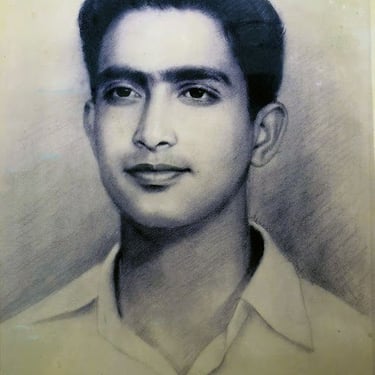
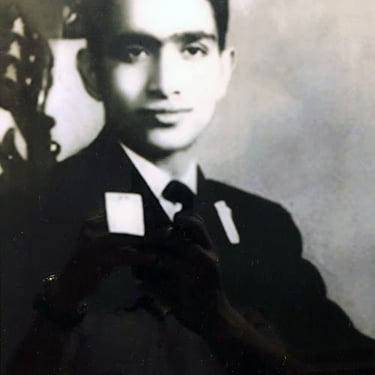
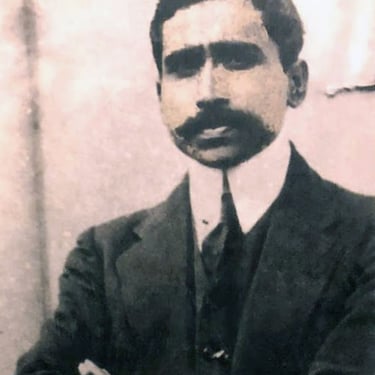
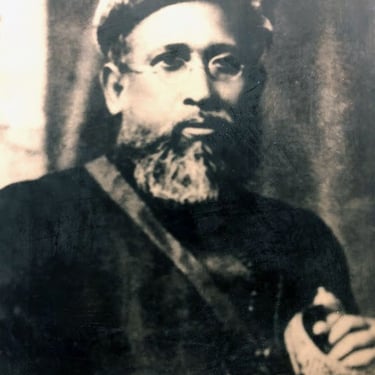
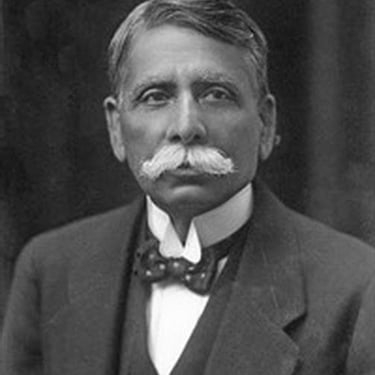
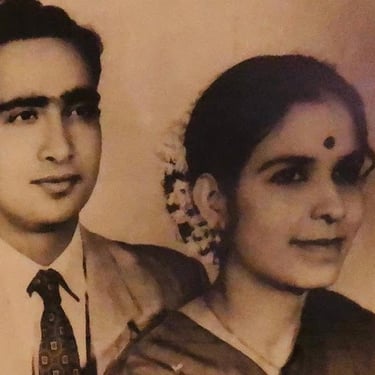
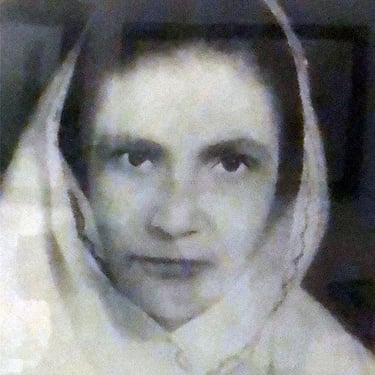
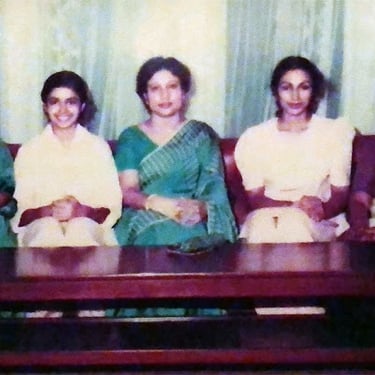
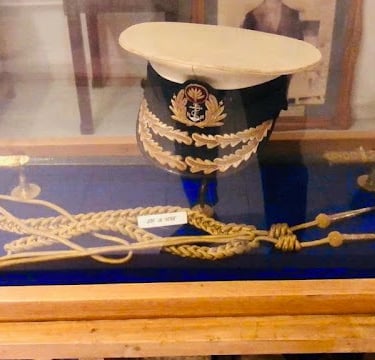
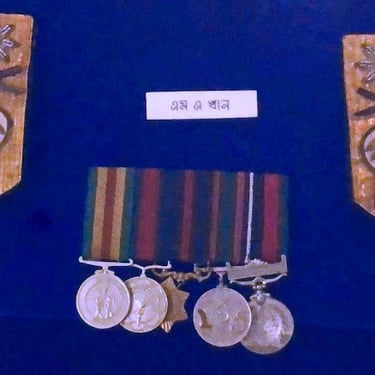

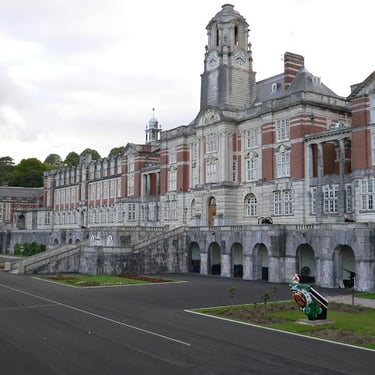
Silam Union’s Pride: Distinguished Individuals
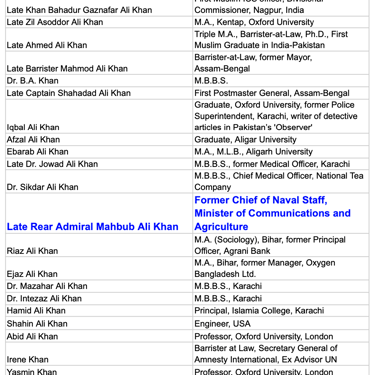
Life in the Pakistan Navy
Mahbub Ali Khan began his naval career in 1952 when he joined the executive branch of the Pakistan Navy as a cadet. His initial military training took place at a military school in Quetta, located in West Pakistan. Demonstrating early promise and discipline, he was selected for higher naval education abroad.
For advanced training, he attended the prestigious Britannia Royal Naval College in Dartmouth, England, where he completed his graduation. His time at Dartmouth not only honed his naval skills but also prepared him for a distinguished career ahead.
In 1955, shortly after his return from England, Mahbub Ali Khan married Sayeeda Iqbal Manda Banu. The couple had two daughters: Shahina Khan and Zubaida Khan.
On 1 May 1956, he received his standing commission in the Pakistan Navy. Over the following years, he held several key positions in the naval hierarchy. In 1960, he was appointed Gunnery Officer aboard PNS Tughril, a significant role in his early career. His discipline and dedication were internationally recognized when, in 1963, Queen Elizabeth II of the United Kingdom honored him for his exemplary conduct as an officer.
In 1964, he served as the Torpedo and Anti-Submarine Officer aboard PNS Tippu Sultan, further deepening his specialization in naval warfare. From 1967 to 1968, he was stationed at the Ministry of Defence in Rawalpindi, serving as a Staff Officer at the Joint Chiefs’ Secretariat.
By 1970, Mahbub Ali Khan had taken on the role of Officer-in-Charge of the Torpedo and Anti-Submarine School at PNS Himalaya. During this period, he was also appointed Seaward Defence Officer in Karachi, where he oversaw coastal defense operations.
Throughout his career, Mahbub Ali Khan demonstrated unwavering professionalism, technical expertise, and a strong commitment to the service of Pakistan’s naval forces.
Life During the Liberation War of Bangladesh (1971)
During the historic Liberation War of Bangladesh in 1971, when East Pakistan fought for independence from West Pakistan, Mahbub Ali Khan found himself in a perilous position. At the time, he was residing in West Pakistan. His unwavering patriotism and loyalty to the cause of Bangladesh drew the suspicion of the Pakistani authorities.
It was not until 1973—two years after the end of the conflict—that he managed a daring escape. Fleeing from West Pakistan, he first sought refuge in Afghanistan. From there, he traveled to India and ultimately made his way back to his beloved homeland, Bangladesh.
Life and Career in the Bangladesh Navy
Mahbub Ali Khan played a pivotal role in the development and modernization of the Bangladesh Navy during the 1970s and early 1980s.
In October 1973, Mahbub Ali became the first Bengali appointed as the Commandant of the Mercantile Academy in Chittagong, marking an important milestone in his naval career. His leadership skills quickly gained recognition, and by February 1976, he was appointed Assistant Chief of Naval Staff, overseeing Operations and Personnel.
A significant event in Bangladesh Navy’s history occurred in December 1976, when the Royal Navy of the United Kingdom sold a Salisbury-class frigate to Bangladesh. The vessel was commissioned as the B.N.S. (Bangladeshi Naval Ship) Umar Farooq and arrived in Bangladesh on 27 March 1977. Mahbub Ali Khan was appointed the captain of this ship and led voyages to several international ports including Algeria, Yugoslavia, Egypt, Saudi Arabia, and Sri Lanka, showcasing Bangladesh’s growing naval presence abroad.
On 4 November 1979, Mahbub Ali Khan was appointed Chief of Naval Staff, and he was promoted to the rank of Rear Admiral on 1 January 1980. In this capacity, he worked diligently to modernize the Navy and strengthen maritime security.
One of the notable challenges during his tenure involved the South Talpatti sandbar (also known as New Moore Island), which emerged after the 1970 Bhola cyclone in the Bay of Bengal. Though uninhabited, this sandbar was claimed by both India and Bangladesh due to speculation about potential oil and natural gas reserves. Under Rear Admiral Mahbub Ali Khan’s command, Bangladesh maintained sovereignty over the sandbar.
Additionally, the Bangladesh Navy, under his leadership, successfully curtailed piracy in the Bay of Bengal, enhancing maritime safety in the region. He also took proactive measures to ensure the security of the ecologically vital Sundarbans mangrove forest area.
Mahbub Ali Khan’s contributions significantly shaped the trajectory of the Bangladesh Navy, solidifying its operational capacity and regional standing during a critical period in the nation’s history.
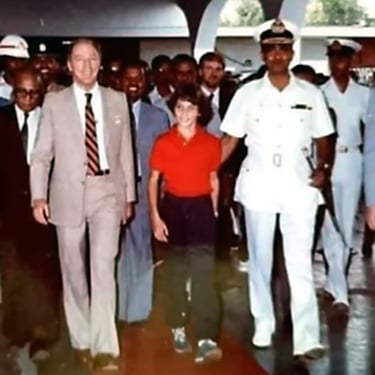
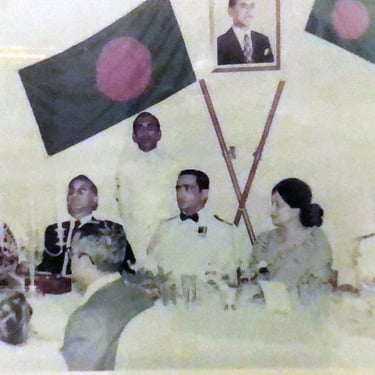
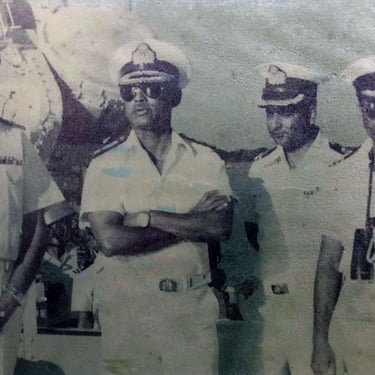
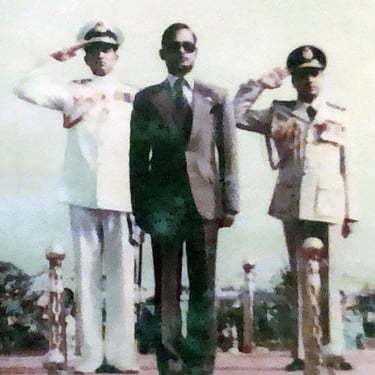
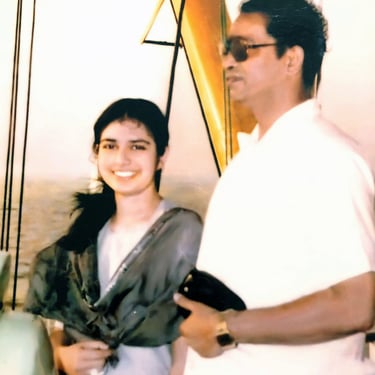
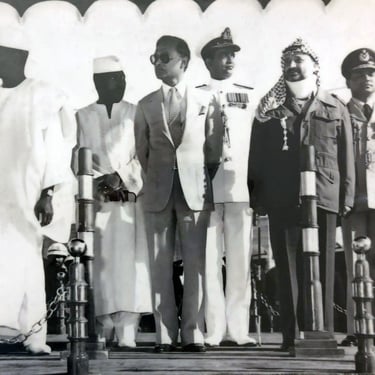
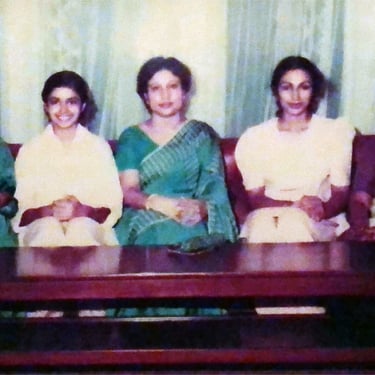

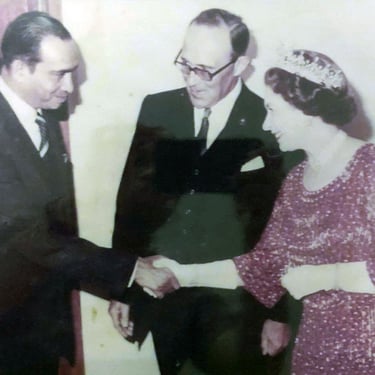
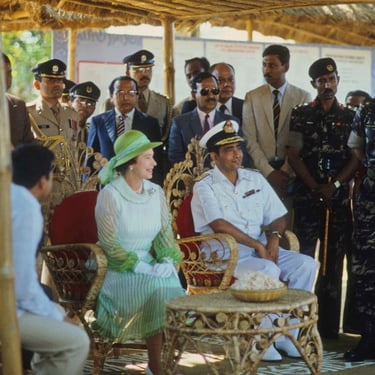
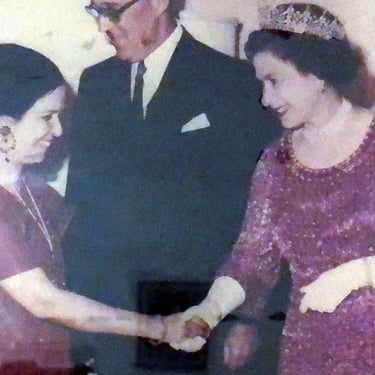
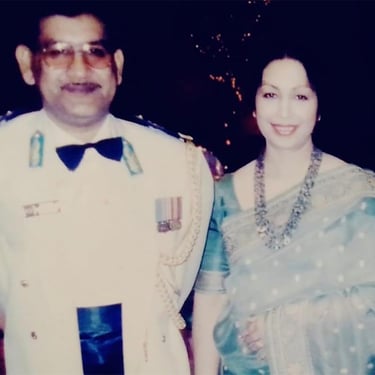
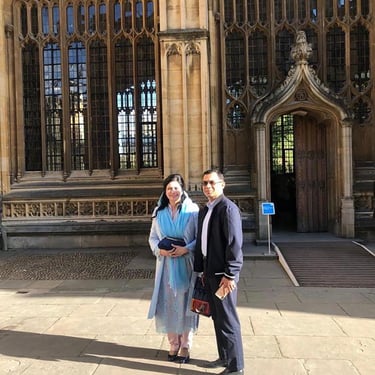
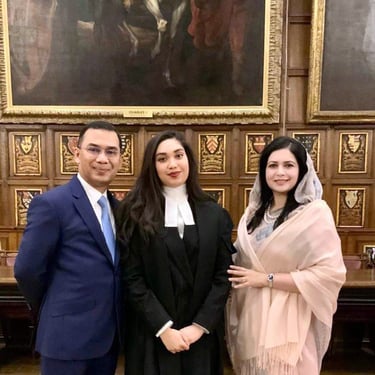
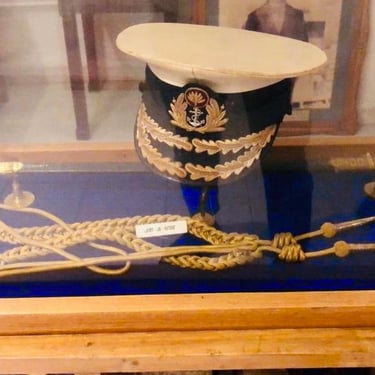
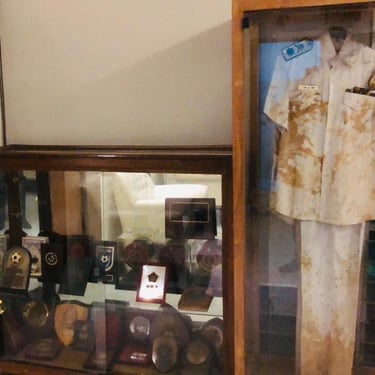
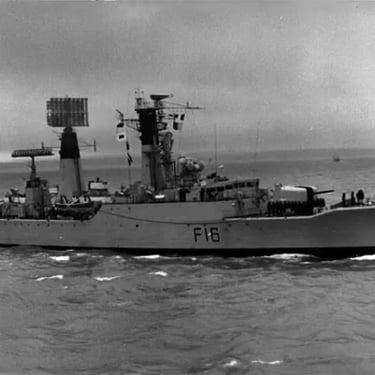
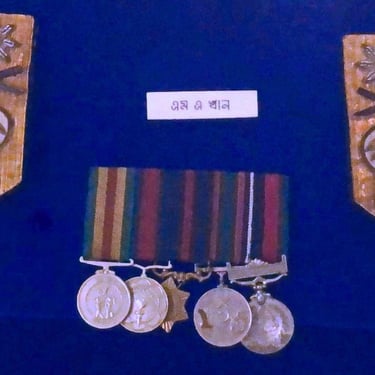
Involvement in Politics and Relationships with Political Figures
Rear Admiral Mahbub Ali Khan played a significant role not only as a military leader but also as an influential political figure in Bangladesh. His career bridged military service and key governmental roles during pivotal periods in the country’s history.
Political Roles and Appointments
Ministerial Positions:
During President Ziaur Rahman’s tenure, Mahbub Ali Khan simultaneously held the position of Chief of the Bangladesh Navy and Minister of Telecommunications. His portfolio expanded as he became involved in various government ministries.JAGODAL Membership:
Mahbub Ali Khan was a member of JAGODAL, a political party temporarily formed under President Ziaur Rahman, reflecting his active political engagement beyond military duties.Role During Martial Law (1982):
When martial law was imposed in Bangladesh in 1982, Rear Admiral Mahbub Ali Khan was appointed Deputy Chief Martial Law Administrator. Concurrently, he served as an adviser to the Ministry of Communications. From 10 July 1982 to 1 June 1984, he held the office of Minister of Communications.Minister of Agriculture:
Until his death, he served as the Minister of Agriculture. Under President Hussain Muhammad Ershad, Mahbub Ali Khan continued to champion the Green and Agricultural Movement initiated by President Ziaur Rahman, demonstrating his long-term commitment to agricultural development.
Relationships with Political Leaders
With Sheikh Mujibur Rahman:
After the Liberation War of Bangladesh, Sheikh Mujibur Rahman personally entrusted Mahbub Ali Khan with the task of modernizing the Bangladesh Navy, indicating high regard for his leadership and expertise.With President Ziaur Rahman and Family:
Mahbub Ali Khan maintained a close relationship with President Ziaur Rahman. Notably, Rezaur Rahman, the elder brother of President Zia, was a naval colleague of Mahbub Ali Khan, fostering a personal connection. This relationship extended into family ties as well; Mahbub Ali Khan’s youngest daughter, Zubaida Khan, is married to Tarique Rahman, the eldest son of President Ziaur Rahman.
Cross-Political Respect:
Throughout his career, Mahbub Ali Khan was respected by leaders across the political spectrum, reflecting his ability to maintain good relations regardless of the prevailing political climate.
Death of Rear Admiral Mahbub Ali Khan
On 6 August 1984, Rear Admiral Mahbub Ali Khan traveled to Tejgaon Airport in Dhaka to investigate a recent air crash in the vicinity. During the investigation at the airport, he suffered a sudden heart attack. He was immediately rushed to the Combined Military Hospital (CMH), but despite medical efforts, he passed away at the age of 49.
Rear Admiral Mahbub Ali Khan was laid to rest at the Banani Defence Graveyard in Dhaka, honoring his service and dedication.



